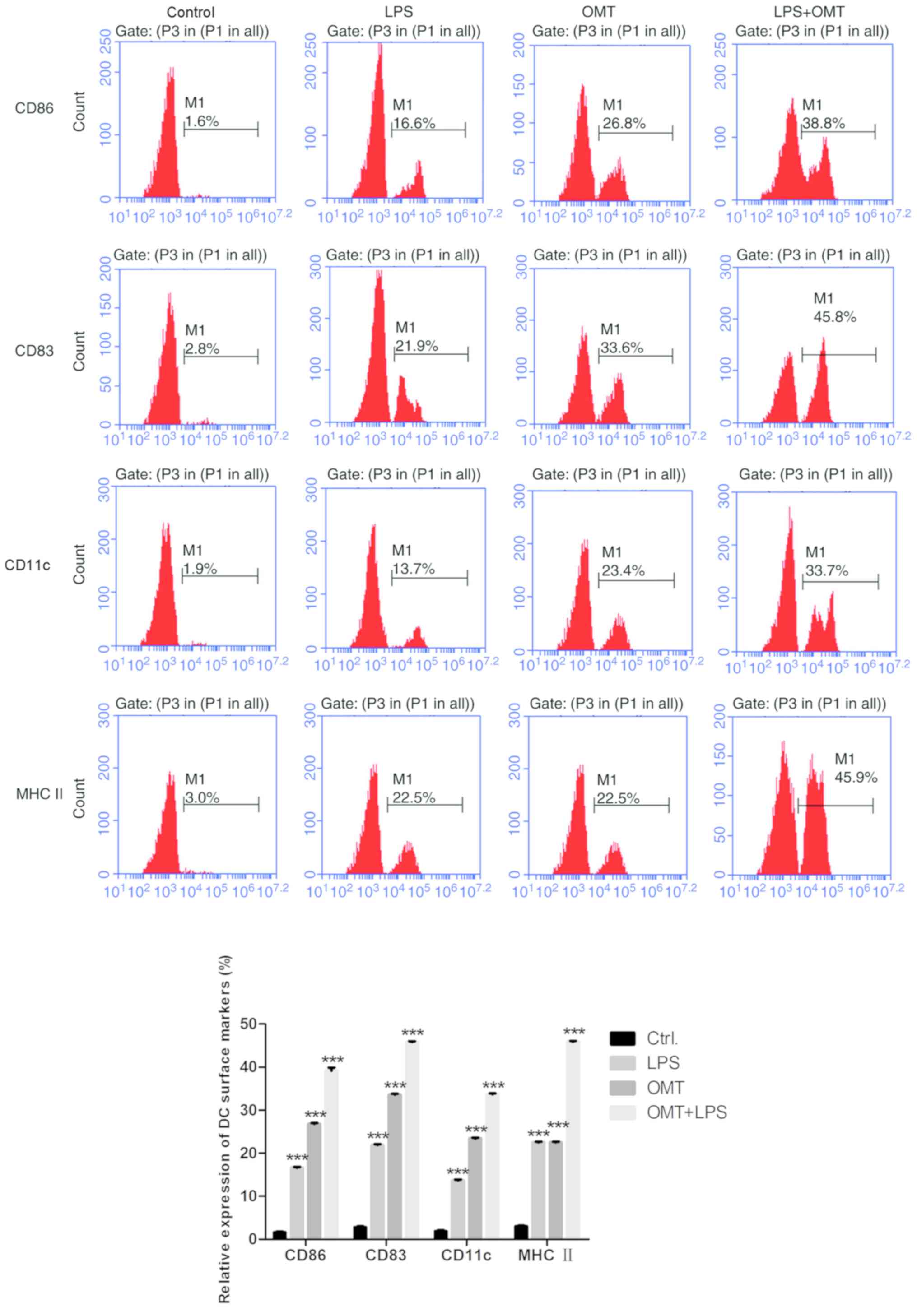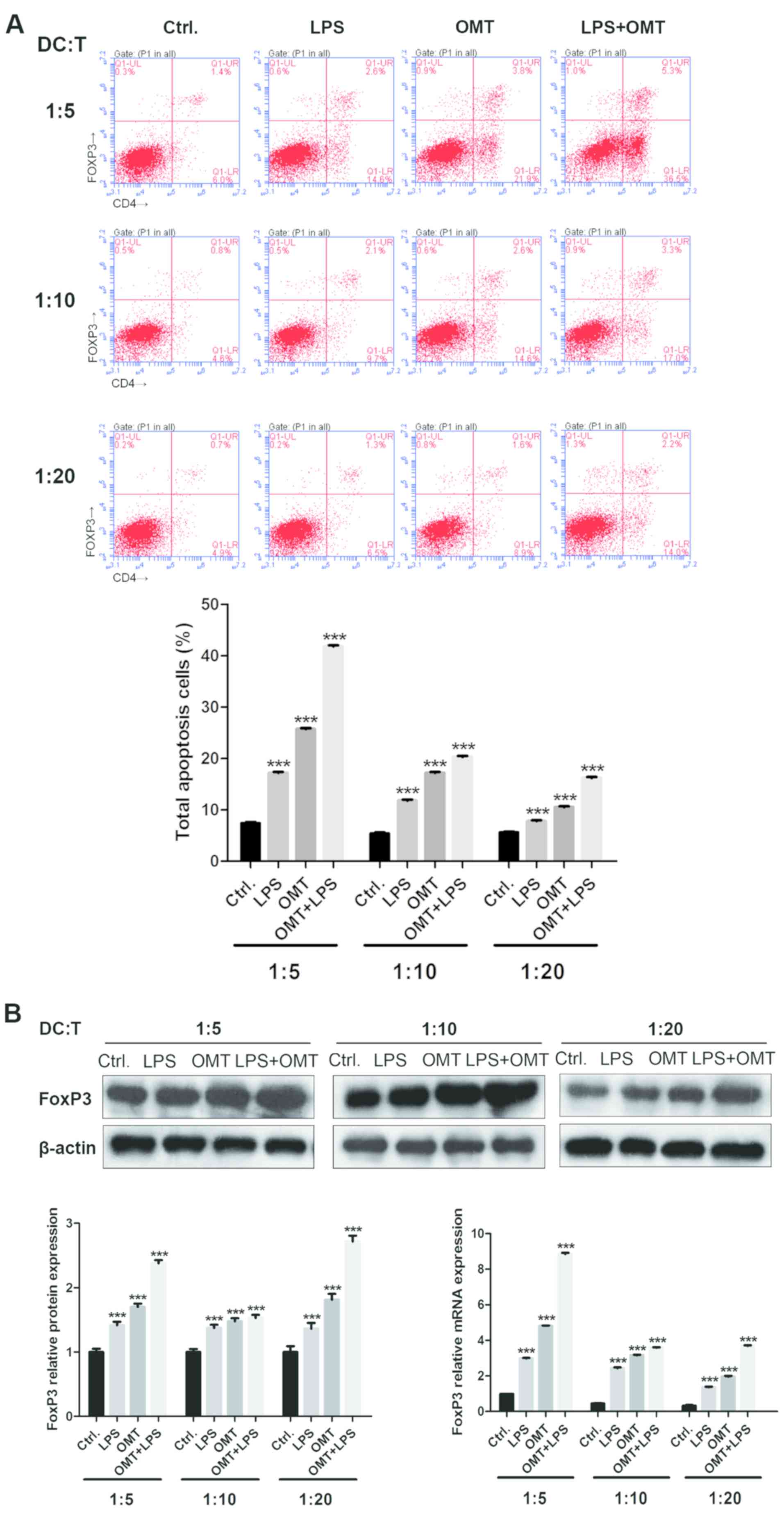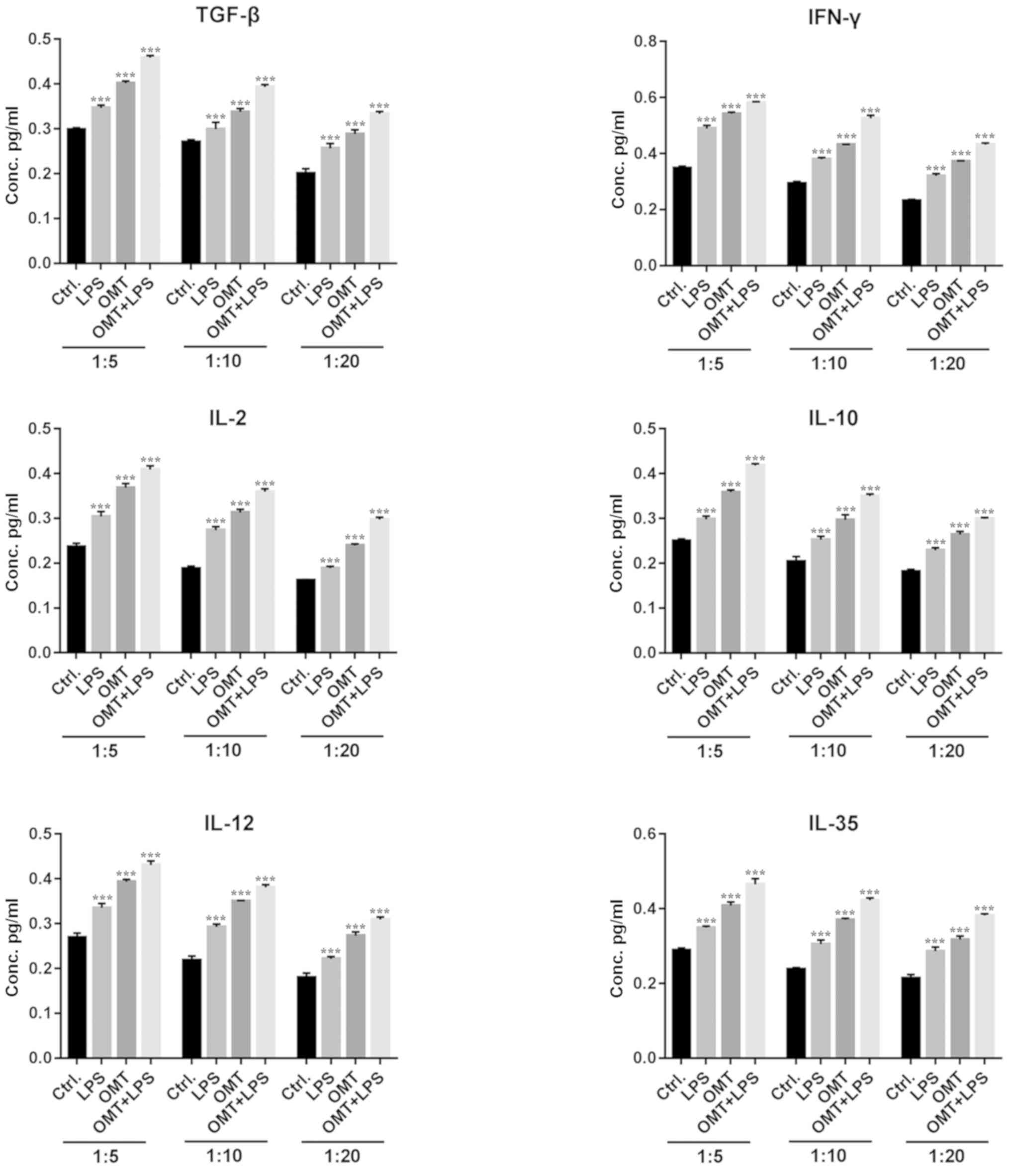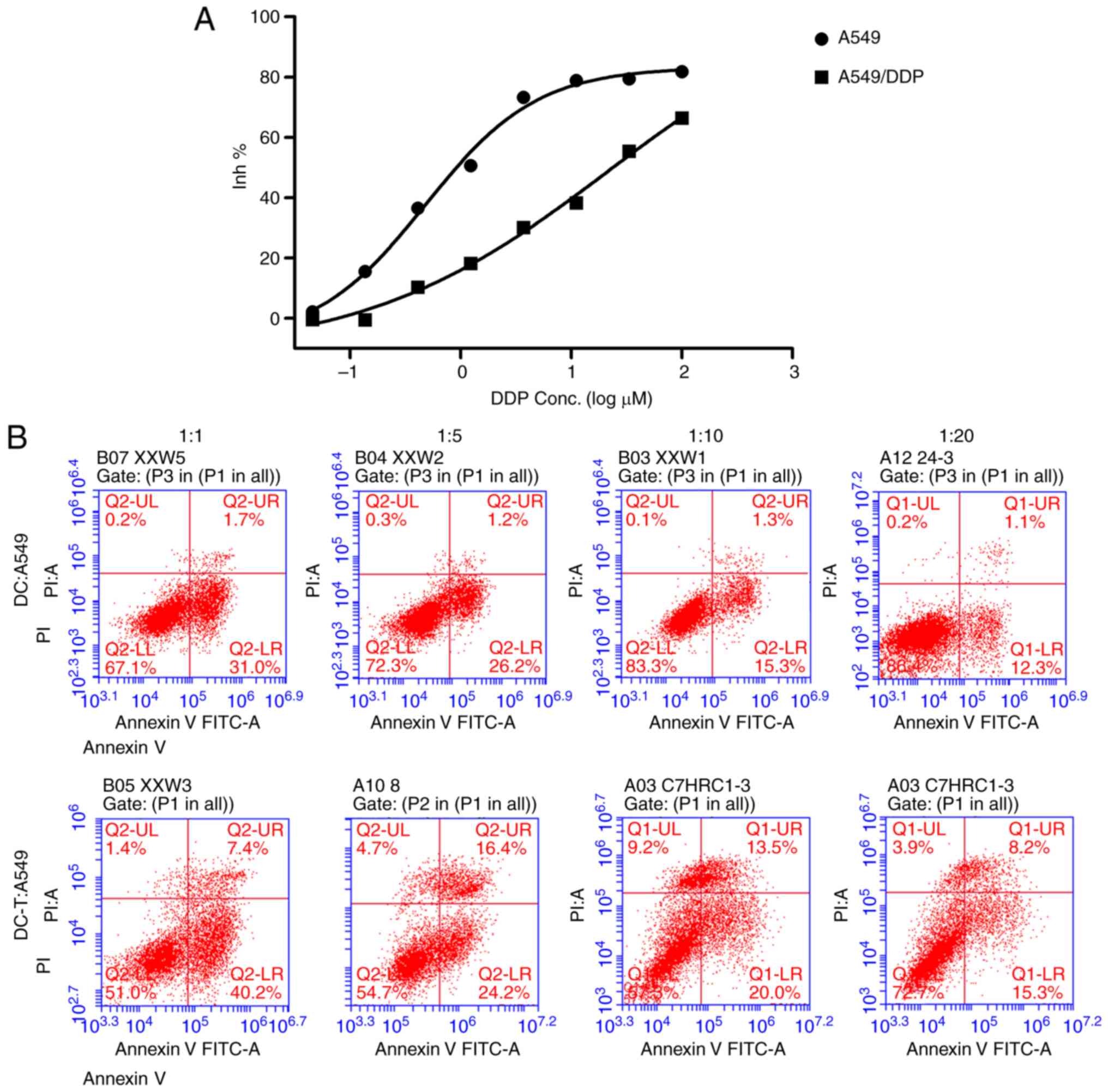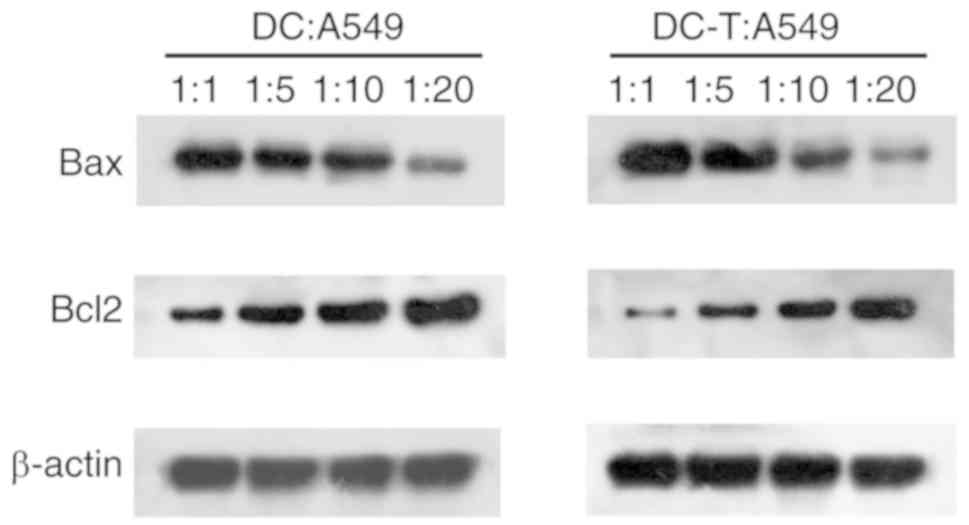|
1
|
Liu Y, Xu Y, Ji W, Li X, Sun B, Gao Q and
Su C: Antitumor activities of matrine and oxymatrine: Literature
review. Tumour Biol. 35:5111–5119. 2014. View Article : Google Scholar : PubMed/NCBI
|
|
2
|
Parvez MK, Arbab AH, Al-Dosari MS and
Al-Rehaily AJ: Antiviral natural products against chronic hepatitis
B: Recent developments. Curr Pharm Des. 22:286–293. 2016.
View Article : Google Scholar : PubMed/NCBI
|
|
3
|
Liang CZ, Zhang JK, Shi Z, Liu B, Shen CQ
and Tao HM: Matrine induces caspase-dependent apoptosis in human
osteosarcoma cells in vitro and in vivo through the upregulation of
Bax and Fas/FasL and downregulation of Bcl-2. Cancer Chemother
Pharmacol. 69:317–331. 2012. View Article : Google Scholar : PubMed/NCBI
|
|
4
|
Zhao B, Li B, Bai S, Shen L, Ren R, Jonas
JB, Xu X, Lu Q and Liu Q: Effects of matrine on proliferation and
apoptosis of cultured retinoblastoma cells. Graefes Arch Clin Exp
Ophthalmol. 250:897–905. 2012. View Article : Google Scholar : PubMed/NCBI
|
|
5
|
Xing Y, Yan F, Liu Y, Liu Y and Zhao Y:
Matrine inhibits 3T3-L1 preadipocyte differentiation associated
with suppression of ERK1/2 phosphorylation. Biochem Biophys Res
Commun. 396:691–695. 2010. View Article : Google Scholar : PubMed/NCBI
|
|
6
|
Zhang S, Zhang Y, Zhuang Y, Wang J, Ye J,
Zhang S, Wu J, Yu K and Han Y: Matrine induces apoptosis in human
acute myeloid leukemia cells via the mitochondrial pathway and Akt
inactivation. PLoS One. 7:e468532012. View Article : Google Scholar : PubMed/NCBI
|
|
7
|
Chen H, Zhang J, Luo J, Lai F, Wang Z,
Tong H, Lu D, Bu H, Zhang R and Lin S: Antiangiogenic effects of
oxymatrine on pancreatic cancer by inhibition of the NF-κB-mediated
VEGF signaling pathway. Oncol Rep. 30:589–595. 2013. View Article : Google Scholar : PubMed/NCBI
|
|
8
|
Yu H, Zhang H, Li D, Zhang X, Xue H and
Zhao S: Matrine inhibits matrix metalloproteinase-9 expression and
invasion of human hepatocellular carcinoma cells. J Asian Nat Prod
Res. 13:242–250. 2011. View Article : Google Scholar : PubMed/NCBI
|
|
9
|
Sun Q, Ma W, Gao Y, Zheng W, Zhang B and
Peng Y: Meta-analysis: Therapeutic effect of transcatheter arterial
chemoembolization combined with compound kushen injection in
hepatocellular carcinoma. Afr J Tradit Complement Altern Med.
9:178–188. 2012. View Article : Google Scholar : PubMed/NCBI
|
|
10
|
Villadangos JA, Schnorrer P and Wilson NS:
Control of MHC class II antigen presentation in dendritic cells: A
balance between creative and destructive forces. Immunol Rev.
207:191–205. 2005. View Article : Google Scholar : PubMed/NCBI
|
|
11
|
Merad M, Sathe P, Helft J, Miller J and
Mortha A: The dendritic cell lineage: Ontogeny and function of
dendritic cells and their subsets in the steady state and the
inflamed setting. Annu Rev Immunol. 31:563–604. 2013. View Article : Google Scholar : PubMed/NCBI
|
|
12
|
Sallusto F and Lanzavecchia A: Efficient
presentation of soluble antigen by cultured human dendritic cells
is maintained by granulocyte/macrophage colony-stimulating factor
plus interleukin 4 and downregulated by tumor necrosis factor
alpha. J Exp Med. 179:1109–1118. 1994. View Article : Google Scholar : PubMed/NCBI
|
|
13
|
Ghiringhelli F and Apetoh L: The interplay
between the immune system and chemotherapy: emerging methods for
optimizing therapy. Expert Rev Clin Immunol. 10:19–30. 2014.
View Article : Google Scholar : PubMed/NCBI
|
|
14
|
Dong Y, Xi H, Yu Y, Wang Q, Jiang K and Li
L: Effects of oxymatrine on the serum levels of T helper cell 1 and
2 cytokines and the expression of the S gene in hepatitis B virus S
gene transgenic mice: A study on the anti-hepatitis B virus
mechanism of oxymatrine. J Gastroenterol Hepatol. 17:1299–1306.
2002. View Article : Google Scholar : PubMed/NCBI
|
|
15
|
Zhou Y, Wang HL, Zhao WC, Chen Y and Deng
HZ: Total alkaloids of Sophora alopecuroides increases the
expression of CD4+ CD25+ Tregs and
IL-10 in rats with experimental colitis. Am J Chin Med. 38:265–277.
2010. View Article : Google Scholar : PubMed/NCBI
|
|
16
|
Livak KJ and Schmittgen TD: Analysis of
relative gene expression data using real-time quantitative PCR and
the 2(-Delta Delta C(T)) method. Methods. 25:402–408. 2001.
View Article : Google Scholar : PubMed/NCBI
|
|
17
|
Stein J, Steven S, Bros M, Sudowe S,
Hausding M, Oelze M, Münzel T, Grabbe S, Reske-Kunz A and Daiber A:
Role of protein kinase C and Nox2-derived reactive oxygen species
formation in the activation and maturation of dendritic cells by
phorbol ester and lipopolysaccharide. Oxid Med Cell Longev.
2017:41572132017. View Article : Google Scholar : PubMed/NCBI
|
|
18
|
Li S, Zhang Y, Liu Q, Zhao Q, Xu L, Huang
S, Huang S and Wei X: Oxymatrine inhibits proliferation of human
bladder cancer T24 cells by inducing apoptosis and cell cycle
arrest. Oncol Lett. 13:4453–4458. 2017. View Article : Google Scholar : PubMed/NCBI
|
|
19
|
Lin B, Li D and Zhang L: Oxymatrine
mediates Bax and Bcl-2 expression in human breast cancer MCF-7
cells. Pharmazie. 71:154–157. 2016.PubMed/NCBI
|
|
20
|
Sarhan D, Palma M, Mao Y, Adamson L,
Kiessling R, Mellstedt H, Österborg A and Lundqvist A: Dendritic
cell regulation of NK-cell responses involves lymphotoxin-α, IL-12,
and TGF-β. Eur J Immunol. 45:1783–1793. 2015. View Article : Google Scholar : PubMed/NCBI
|
|
21
|
Dudek AM, Martin S, Garg AD and Agostinis
P: Immature, semi-mature, and fully mature dendritic cells: Toward
a DC-cancer cells interface that augments anticancer immunity.
Front Immunol. 4:4382013. View Article : Google Scholar : PubMed/NCBI
|
|
22
|
Menetrier-Caux C, Montmain G, Dieu MC,
Bain C, Favrot MC, Caux C and Blay JY: Inhibition of the
differentiation of dendritic cells from CD34(+) progenitors by
tumor cells: Rrole of interleukin-6 and macrophage
colony-stimulating factor. Blood. 92:4778–4791. 1998.PubMed/NCBI
|
|
23
|
Bell D, Chomarat P, Broyles D, Netto G,
Harb GM, Lebecque S, Valladeau J, Davoust J, Palucka KA and
Banchereau J: In breast carcinoma tissue, immature dendritic cells
reside within the tumor, whereas mature dendritic cells are located
in peritumoral areas. J Exp Med. 190:1417–1426. 1999. View Article : Google Scholar : PubMed/NCBI
|
|
24
|
Sittig S, de Vries I and Schreibelt G:
Primary human blood dendritic cells for cancer
immunotherapy-tailoring the immune response by dendritic cell
maturation. Biomedicines. 3:282–303. 2015. View Article : Google Scholar : PubMed/NCBI
|
|
25
|
Joffre O, Nolte MA, Spörri R and Reis e
Sousa C: Inflammatory signals in dendritic cell activation and the
induction of adaptive immunity. Immunol Rev. 227:234–247. 2009.
View Article : Google Scholar : PubMed/NCBI
|
|
26
|
Ma A, Yang Y, Wang Q, Yin W, Jing W and
Zhang Y: Anti-inflammatory effects of oxymatrine on rheumatoid
arthritis in rats via regulating the imbalance between Treg and
Th17 cells. Mol Med Rep. 15:3615–3622. 2017. View Article : Google Scholar : PubMed/NCBI
|
|
27
|
Mao Y, Poschke I and Kiessling R:
Tumour-induced immune suppression: Role of inflammatory mediators
released by myelomonocytic cells. J Intern Med. 276:154–170. 2014.
View Article : Google Scholar : PubMed/NCBI
|
|
28
|
Noy R and Pollard JW: Tumor-associated
macrophages: From mechanisms to therapy. Immunity. 41:492014.
View Article : Google Scholar : PubMed/NCBI
|
|
29
|
Jandus C, Bioley G, Speiser D and Romero
P: Selective accumulation of differentiated FOXP3(+) CD4 (+) T
cells in metastatic tumor lesions from melanoma patients compared
to peripheral blood. Cancer Immunol Immunother. 57:1795–1805. 2008.
View Article : Google Scholar : PubMed/NCBI
|
|
30
|
Yeong J, Thike AA, Lim JC, Lee B, Li H,
Wong SC, Hue SS, Tan PH and Iqbal J: Higher densities of
Foxp3+ regulatory T cells are associated with better
prognosis in triple-negative breast cancer. Breast Cancer Res
Treat. 163:21–35. 2017. View Article : Google Scholar : PubMed/NCBI
|
|
31
|
Jackute J, Zemaitis M, Pranys D,
Sitkauskiene B, Miliauskas S, Bajoriunas V, Lavinskiene S and
Sakalauskas R: The prognostic influence of tumor infiltrating
Foxp3(+)CD4(+), CD4(+) and CD8(+) T cells in resected non-small
cell lung cancer. J Inflamm (Lond). 12:632015. View Article : Google Scholar : PubMed/NCBI
|
|
32
|
West NR, Kost SE, Martin SD, Milne K,
Deleeuw RJ, Nelson BH and Watson PH: Tumour-infiltrating FOXP3(+)
lymphocytes are associated with cytotoxic immune responses and good
clinical outcome in oestrogen receptor-negative breast cancer. Br J
Cancer. 108:155–162. 2013. View Article : Google Scholar : PubMed/NCBI
|
|
33
|
Badoual C, Sandoval F, Pere H, Hans S, Gey
A, Merillon N, Van Ryswick C, Quintin-Colonna F, Bruneval P, Brasnu
D, et al: Better understanding tumor-host interaction in head and
neck cancer to improve the design and development of
immunotherapeutic strategies. Head Neck. 32:946–958.
2010.PubMed/NCBI
|
|
34
|
Musolino C, Allegra A, Pioggia G and
Gangemi S: Immature myeloid-derived suppressor cells: A bridge
between inflammation and cancer. Oncol Rep. 37:671–683. 2017.
View Article : Google Scholar : PubMed/NCBI
|
|
35
|
Gao F, Liang B, Reddy S, Farias-Eisner R
and Su X: Role of inflammation-associated microenvironment in
tumorigenesis and metastasis. Curr Cancer Drug Targets. 14:30–45.
2014. View Article : Google Scholar : PubMed/NCBI
|
|
36
|
Beatty GL: Overcoming therapeutic
resistance by targeting cancer inflammation. Am Soc Clin Oncol Educ
Book. 35:e168–e173. 2016. View Article : Google Scholar : PubMed/NCBI
|
|
37
|
Xu G, Yao L, Rao S, Gong Z, Zhang S and Yu
S: Attenuation of acute lung injury in mice by oxymatrine is
associated with inhibition of phosphorylated p38 mitogen-activated
protein kinase. J Ethnopharmacol. 98:177–183. 2005. View Article : Google Scholar : PubMed/NCBI
|
|
38
|
Chen X, Sun R, Hu J, Mo Z, Yang Z, Liao D
and Zhong N: Attenuation of bleomycin-induced lung fibrosis by
oxymatrine is associated with regulation of fibroblast
proliferation and collagen production in primary culture. Basic
Clin Pharmacol Toxicol. 103:278–286. 2008. View Article : Google Scholar : PubMed/NCBI
|
|
39
|
Hu ST, Tang Y, Shen YF, Ao HH, Bai J, Wang
YL and Yang YJ: Protective effect of oxymatrine on chronic rat
heart failure. J Physiol Sci. 61:363–372. 2011. View Article : Google Scholar : PubMed/NCBI
|
|
40
|
Jiang G, Liu X, Wang M, Chen H, Chen Z and
Qiu T: Oxymatrine ameliorates renal ischemia-reperfusion injury
from oxidative stress through Nrf2/HO-1 pathway. Acta Cir Bras.
30:422–429. 2015. View Article : Google Scholar : PubMed/NCBI
|
|
41
|
Ning Y and Xin W: Effect on Toll-like
receptor 7 signaling pathway in PBMCs of chronic hepatitis B
patients by oxymatrine in vitro. Chin Arch Trad Chin Med.
36:1196–1199. 2018.
|
|
42
|
Zhang J and Tang A: Reversal effect of
matrine on drug resistance of human nasopharyngeal carcinoma cell
line. Zhong Yao Cai. 35:1989–1994. 2012.(In Chinese). PubMed/NCBI
|
|
43
|
Wang HQ, Jin JJ and Wang J: Matrine
induces mitochondrial apoptosis in cisplatin-resistant non-small
cell lung cancer cells via suppression of β-catenin/survivin
signaling. Oncol Rep. 33:2561–2566. 2015. View Article : Google Scholar : PubMed/NCBI
|
|
44
|
Luo SX, Deng WY, Wang XF, Lü HF, Han LL,
Chen BB, Chen XB and Li N: Molecular mechanism of
indirubin-3′-monoxime and Matrine in the reversal of paclitaxel
resistance in NCI-H520/TAX25 cell line. Chin Med J (Eng).
126:925–929. 2013.
|
|
45
|
Chai S, To KK and Lin G: Circumvention of
multi-drug resistance of cancer cells by Chinese herbal medicines.
Chin Med. 5:262010. View Article : Google Scholar : PubMed/NCBI
|
|
46
|
Wang B, Han Q and Zhu Y: Oxymatrine
inhibited cell proliferation by inducing apoptosis in human lung
cancer A549 cells. Biomed Mater Eng. 26 (Suppl 1):S165–S172.
2015.PubMed/NCBI
|
|
47
|
Truxova I, Hensler M, Skapa P, Halaska MJ,
Laco J, Ryska A, Spisek R and Fucikova J: Rationale for the
combination of dendritic cell-based vaccination approaches with
chemotherapy agents. Int Rev Cell Mol Biol. 330:115–156. 2017.
View Article : Google Scholar : PubMed/NCBI
|
|
48
|
Di Blasio S, Wortel IM, van Bladel DA, de
Vries LE, Duiveman-de Boer T, Worah K, de Haas N, Buschow SI, de
Vries IJ, Figdor CG and Hato SV: Human CD1c(+) DCs are critical
cellular mediators of immune responses induced by immunogenic cell
death. Oncoimmunology. 5:e11927392016. View Article : Google Scholar : PubMed/NCBI
|
|
49
|
Palucka K and Banchereau J: Cancer
immunotherapy via dendritic cells. Nat Rev Cancer. 12:265–277.
2012. View Article : Google Scholar : PubMed/NCBI
|















